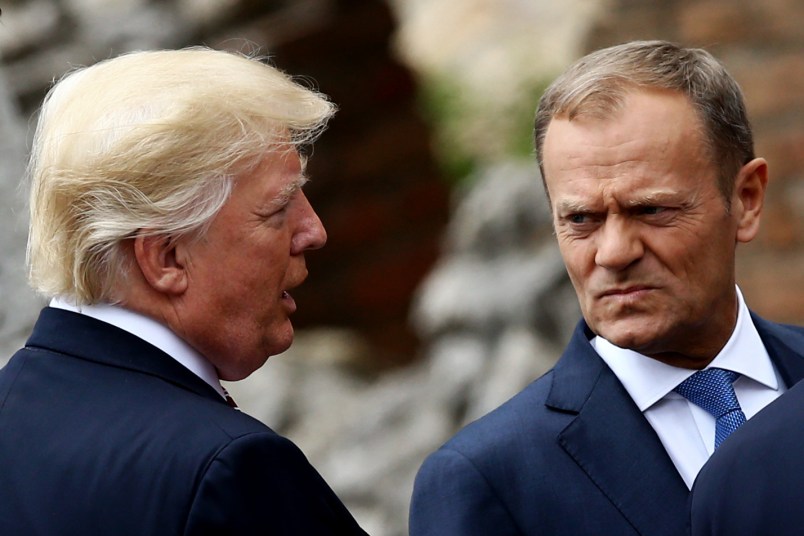BRUSSELS (AP) — Europe and Asia presented a united front Friday in support of free trade based on international rules and cooperation, starkly underscoring their differences with U.S. President Donald Trump’s “America First” policy.
That support for free trade “is the most important signal from this summit, especially valid in the current geopolitical context,” EU Council President Donald Tusk said at the end of a two-day Europe-Asia summit in Brussels.
The meeting comes at a time when Trump is increasingly distancing the United States from global organizations like the United Nations. Trump told the U.N. general assembly last month: “We reject the ideology of globalism, and we embrace the doctrine of patriotism.”
Those at the summit — 30 European leaders, their counterparts from 21 Asian nations as well as top officials from the European Union and the Association of Southeast Asian Nations — have the economic clout to stand up to that kind of rhetoric from Trump. The officials came from countries that represent some two-thirds of the world’s economic output, 55 percent of global trade and 60 percent of the world’s population.
A written statement said the leaders “highlighted the vital need of maintaining an open world economy and upholding the rules-based multilateral trading system, with the World Trade Organization at its core.”
Trump slapped 25 percent tariffs on steel imports and 10 percent on imported aluminum from the EU on June 1. He said the move was to protect U.S. national security interests, but the Europeans claim it is simply protectionism and breaks global trade rules.
The EU hit back with tariffs on about 2.8 billion euros worth ($3.4 billion) of U.S. steel, agricultural and other products.
The stakes are even higher in Trump’s trade war with China. Trump has imposed tariffs on about $250 billion worth of Chinese products amid U.S. accusations that China engages in cyber-theft and coerces foreign companies into handing over technology in return for access to the Chinese market, as well as by Trump’s anger over China’s trade surplus with the U.S.
The wide-ranging agenda in Brussels also included discussions on fighting both climate change and cybercrimes. In their closing statement, the leaders expressed “profound concern that current global efforts are insufficient” to meet goals set out in the 2015 Paris climate accord. Trump has removed the U.S. from that deal.
On the sidelines of the meeting, the EU signed a pact with Vietnam that aims to tackle illegal logging and was to sign a free trade deal with Singapore.
The two-day meeting also was the backdrop for numerous bilateral meetings — EU foreign affairs chief Federica Mogherini discussed human rights violations in Cambodia and Myanmar with those countries’ representatives, while British Prime Minister Theresa May tried to talk up her nation’s post-Brexit relationship with China, South Korea and Singapore in meetings with officials from those countries.
In another of the meeting’s conclusions that ran counter to U.S. policy, European and Asian leaders praised the Iran nuclear deal — another multilateral initiative rejected by Trump.
“Preserving the nuclear deal with Iran is a matter of respecting international agreements, and promoting international security, peace and stability,” they said.
One region where the leaders in Brussels were more closely aligned with Trump was the Korean peninsula, where the U.S. president has been involved with efforts to end North Korea’s nuclear program. The statement in Brussels hailed efforts by South Korea and “other partners” to “achieve lasting peace and stability on a Korean Peninsula free of nuclear weapons.”
Rights groups and lawmakers had called on the European leaders to push their Asian counterparts on human rights, citing abuses in many Asian nations, including the Rohingya crisis in Myanmar and Bangladesh.
Buddhist-majority Myanmar’s military is accused of widespread rights violations against the Muslim Rohingya — including rape, murder, torture and burning villages — which has forced about 700,000 Rohingya to flee to Bangladesh since August 2017.
Without mentioning the Rohingya by name, the leaders underscored the need to pave the way for the “safe, voluntary, dignified and sustainable return of displaced persons to Rakhine State” in Myanmar.
A U.N. mission reported last month that at least 10,000 Rohingya are believed to have died in the violence. The U.N. has called for Myanmar’s top military generals to be prosecuted for genocide and crimes against humanity for their treatment of the Rohingya.







But we’re “making America great!” by dragging it, kicking and screaming, back to the good old days of Smoot-Hawley.
It will not take 20 years for the history to be written, in 5 years the stupidity of the United States and no longer so Great Brittan in destroying their world leadership will be clear. Europe really has to make common cause with reasonable Asian nations on trade and other issues as a counter weight to Trump’s efforts to try to hand world leadership to Putin, MBS, and Xi.
Trump doesn’t have – and never has had – an “America First” policy.
It’s a “Trump First” policy, plain and simple.
As any American can tell you…
Trump’s and the Republican party’s anti-globalist, pro-nationalist policies are extraordinarily dangerous for both the United States and the world at large. Whether they like it or not, the nations of the world are tremendously interdependent on each other. The vast majority of world leaders understand this. Tragically, this concept is beyond Trump’s ability to comprehend. Trade wars, isolationist policies, and sabre-rattling can ultimately only lead in one direction, toward war, and its horrible consequences.
Americans need to wake up and realize that huffing and puffing about “America First” will only contribute to a breakdown in the world order and any chances for world peace. We learned this lesson in the aftermath of World War I, but our failure to heed it led to a second world wide conflagration. We cannot afford to repeat that error.
Once we can come to our own aid, I hope our former friends will return and do the same.
Vote!